- Home
- James Grady
Six Days of the Condor Page 9
Six Days of the Condor Read online
Page 9
Malcolm looked at her for a second, then let go of her arm and nodded. He didn’t care if the doctor brought Sparrow IV’s friend with him. All he wanted was relief.
The doctor turned out to be a paunchy middle-aged man who spoke little. He poked and prodded Malcolm, took his temperature, and looked down his throat so long Malcolm thought he would throw up. The doctor finally looked up and said, “You’ve got a mild case of strep throat, my boy.” He looked at an anxious Wendy hovering nearby. “Nothing to worry about, really. We’ll fix him up.” Malcolm watched the doctor fiddle with something in his bag. When he turned toward Malcolm there was a hypodermic needle in his hand. “Roll over and pull your shorts down.”
A picture of a limp, cold arm with a tiny puncture flashed through Malcolm’s mind. He froze.
“For Christ’s sake, it won’t hurt that much. It’s only penicillin.”
After giving Malcolm his shot, the doctor turned to Wendy. “Here,” he said, handing her a slip of paper. “Get this filled and see that he takes them. He’ll need at least a day’s rest.” The doctor smiled as he leaned close to Wendy. He whispered, “And Wendy, I do mean total rest.” He laughed all the way to the door. On the porch, he turned to her and slyly said, “Whom do I bill?”
Wendy smiled shyly and handed him twenty dollars. The doctor started to speak, but Wendy cut his protest short. “He can afford it. He—we—really appreciate you coming over.”
“Hmph,” snorted the doctor sarcastically, “he should. I’m late for my coffee break.” He paused to look at her. “You know, he’s the kind of prescription I’ve thought you needed for a long time.” With a wave of his hand he was gone.
By the time Wendy got upstairs, Malcolm was asleep. She quietly left the apartment. She spent the morning shopping with the list Malcolm and she had composed while waiting for the doctor. Besides filling the prescription, she bought Malcolm several pairs of underwear, socks, some shirts and pants, a jacket, and four different paperbacks, since she didn’t know what he liked to read. She carted her bundles home in time to make lunch. She spent a quiet afternoon and evening, occasionally checking on her charge. She smiled all day long.
Supervision of America’s large and sometimes cumbersome intelligence community has classically posed the problem of sed quis custodiet ipsos Custodes: who guards the guardians? In addition to the internal checks existing independently in each agency, the National Security Act of 1947 created the National Security Council, a group whose composition varies with each change of presidential administration. The Council always includes the President and Vice-President and usually includes major cabinet members. The Council’s basic duty is to oversee the activities of the intelligence agencies and to make policy decisions guiding those activities.
But the members of the National Security Council are very busy men with demanding duties besides overseeing a huge intelligence network. Council members by and large do not have the time to devote to intelligence matters, so most decisions about the intelligence community are made by a smaller Council “subcommittee” known as the Special Group. Insiders often refer to the Special Group as the “54/12 Group,” so called because it was created by Secret Order 54/12 early in the Eisenhower years. The 54/12 Group is virtually unknown outside the intelligence community, and even there only a handful of men are aware of its existence.
Composition of the 54/12 Group also varies with each administration. Its membership generally includes the director of the CIA, the Under Secretary of State for Political Affairs or his deputy, and the Secretary and Deputy Secretary of Defense. In the Kennedy and early Johnson administrations the presidential representative and key man on the 54/12 Group was McGeorge Bundy. The other members were McCone, McNamara, Roswell Gilpatric (Deputy Secretary of Defense), and U. Alexis Johnson (Deputy Under Secretary of State for Political Affairs).
Overseeing the American intelligence community poses problems for even a small, full-time group of professionals. One is that the overseers must depend on those they oversee for much of the information necessary for regulation. Such a situation is naturally a delicate perplexity.
There is also the problem of fragmented authority. For example, if an American scientist spies on the country while employed by NASA, then defects to Russia and continues his spying but does it from France, which American agency is responsible for his neutralization? The FBI, since he began his activities under their jurisdiction, or the CIA, since he shifted to activities under their purview? With the possibility of bureaucratic jealousies escalating into open rivalry, such questions take on major import.
Shortly after it was formed, the 54/12 Group tried to solve the problems of internal information and fragmented authority. The 54/12 Group established a small special security section, a section with no identity save that of staff for the 54/12 Group. The special section’s duties included liaison work. The head of the special section serves on a board composed of leading staff members from all intelligence agencies. He has the power to arbitrate jurisdictional disputes. The special section also has the responsibility of independently evaluating all the information given to the 54/12 Group by the intelligence community. But most important, the special section is given the power to perform “such necessary security functions as extraordinary circumstances might dictate, subject to Group [the 54/12 Group] regulation.”
To help the special section perform its duties, the 54/12 Group assigned a small staff to the section chief and allowed him to draw on other major security and intelligence groups for needed staff and authority.
The 54/12 Group knows it has created a potential problem. The special section could follow the natural tendency of most government organizations and grow in size and awkwardness, thereby becoming a part of the problem it was created to solve. The special section, small though it is, has tremendous power as well as tremendous potential. A small mistake by the section could be a lever of great magnitude. The 54/12 Group supervises its creation cautiously. They keep a firm check on any bureaucratic growth potentials in the section, they carefully review its activities, keeping the operational work of the section at a bare minimum, and they place only extraordinary men in charge of the section.
While Malcolm and Wendy waited for the doctor, a large, competent-looking man sat in an outer office on Pennsylvania Avenue, waiting to answer a very special summons. His name was Kevin Powell. He waited patiently but eagerly: he did not receive such a summons every day. Finally a secretary beckoned, and he entered the inner office of a man who looked like a kindly, delicate old uncle. The old man motioned Powell to a chair.
“Ah, Kevin, how wonderful to see you.”
“Good to see you, sir. You’re looking fit.”
“As do you, my boy, as do you. Here.” The old man tossed Powell a file folder. “Read this.” As Powell read, the old man examined him closely. The plastic surgeons had done a marvelous job on his ear, and it took an experienced eye to detect the slight bulge close to his left armpit. When Powell raised his eyes, the old man said, “What do you think, my boy?”
Powell chose his words carefully. “Very strange, sir. I’m not sure what it means, though it must mean a great deal.”
“Exactly my thoughts, my boy, exactly mine. Both the Agency and the Bureau [FBI] have squads of men scouring the city, watching the airports, buses, trains, the usual routine, only expanded to quite a staggering level. As you know, it’s these routine operations that make or break most endeavors, and I must say they are doing fairly well. Or they were up until now.”
He paused for breath and an encouraging look of interest from Powell. “They’ve found a barber who remembers giving our boy a haircut—rather predictable yet commendable action on his part—sometime after Weatherby was shot. By the way, he is coming along splendidly. They hope to question him late this evening. Where was I … Oh, yes. They canvassed the area and found where he bought some clothes, but then they lost him. They have no idea where to look next. I have one or two ideas about that myse
lf, but I’ll save them for later. There are some points I want you to check me on. See if you can answer them for me, or maybe find some questions I can’t find.
“Why? Why the whole thing? If it was Czechoslovakia, why that particular branch, a do-nothing bunch of analysts? If it wasn’t, we’re back to our original question.
“Look at the method. Why so blatant? Why was the man Heidegger hit the night before? What did he know that the others didn’t? If he was special, why kill the others too? If Malcolm works for them, they didn’t need to question Heidegger about much. Malcolm could have told them.
“Then we have our boy Malcolm, Malcolm with the many ‘why’s. If he is a double, why did he use the Panic procedure? If he is a double, why did he set up a meeting—to kill Sparrow IV, whom he could have picked off at his leisure had he worked at establishing the poor fellow’s identity? If he isn’t a double, why did he shoot the two men he called to take him to safety? Why did he go to Heidegger’s apartment after the shooting? And, of course, where, why, and how is he now?
“There are a lot of other questions that grow from these, but I think these are the main ones. Do you agree?”
Powell nodded and said, “I do. Where do I fit in?”
The old man smiled. “You, my dear boy, have the good fortune to be on loan to my section. As you know, we were created to sort out the mishmashes of bureaucracy. I imagine some of those paper pushers who shuffled my poor old soul here assumed I would be stuck processing paper until I died or retired. Neither of those alternatives appeal to me, so I have redefined liaison work to mean a minimum of paper and a maximum of action, pirated a very good set of operatives, and set up my own little shop, just like in the old days. With the official maze of the intelligence community, I have a good deal of confusion to play with. A dramatist I once knew said the best way to create chaos is to flood the scene with actors. I’ve managed to capitalize on the chaos of others.
“I think some of my efforts,” he added in a modest tone, “small though they may be, have been of some value to the country.
“Now we come to this little affair. It isn’t really much of my business, but the damn thing intrigues me. Besides, I think there is something wrong with the way the Agency and the Bureau are handling the whole thing. First of all, this is a very extraordinary situation, and they are using fairly ordinary means. Second, they’re tripping over each other, both hot to make the pinch, as they say. Then there’s the one thing I can’t really express. Something about this whole affair bothers me. It should never have happened. Both the idea behind the event and the way in which the event manifested itself are so … wrong, so out of place. I think it’s beyond the parameters of the Agency. Not that they’re incompetent—though I think they have missed one or two small points—but they’re just not viewing it from the right place. Do you understand, my boy?”
Powell nodded. “And you are in the right place, right?”
The old man smiled. “Well, let’s just say one foot is in the door. Now here’s what I want you to do. Did you notice our boy’s medical record? Don’t bother looking, I’ll tell you. He has many times the number of colds and respiratory problems he should. He often needs medical attention. Now, if you remember the transcript of the second panic call, he sneezed and said he had a cold. I’m playing a long shot that his cold is much worse, and that wherever he is, he’ll come out to get help. What do you think?”
Powell shrugged. “Might be worth a try.”
The old man was gleeful. “I think so, too. Neither the Agency nor the Bureau has tumbled to this yet, so we have a clear field. Now, I’ve arranged for you to head a special team of D.C. detectives—never mind how I managed it, I did. Start with the general practitioners in the metropolitan area. Find out if any of them have treated anyone like our boy—use his new description.If they haven’t, tell them to report to us if they do. Make up some plausible story so they’ll open up to you. One other thing. Don’t let the others find out we’re looking too. The last time they had a chance, two men got shot.”
Powell stood to go. “I’ll do what I can, sir.”
“Fine, fine, my boy. I knew I could count on you. I’m still thinking on this. If I come up with anything else, I’ll let you know. Good luck.”
Powell left the room. When the door was shut, the old man smiled.
While Kevin Powell began his painstakingly dull check of the Washington medical community, a very striking man with strange eyes climbed out of a taxi in front of Sunny’s Surplus. The man had spent the morning reading a Xeroxed file identical with the one Powell had just examined. He had received the file from a very distinguished-looking gentleman. The man with the strange eyes had a plan for finding Malcolm. He spent an hour driving around the neighborhood, and now he began to walk it. At bars, newspaper stands, public offices, private buildings, anywhere a man could stop for a few minutes, he would stop and show an artist’s projected sketch of Malcolm with short hair. When people seemed reluctant to talk to him, the man flashed one of five sets of credentials the distinguished man had obtained. By 3:30 that afternoon he was tired, but it didn’t show. He was more resolute than ever. He stopped at a Hot Shoppe for coffee. On the way out he flashed the picture and a badge at the cashier in a by now automatic manner. Almost anyone else would have registered the shock he felt when the clerk said she recognized the man.
“Yeah, I saw the son of a bitch. He threw his money at me he was in such a hurry to leave. Ripped a nylon crawling after a rolling nickel.”
“Was he alone?”
“Yeah, who would want to be with a creep like that?”
“Did you see which way he went?”
“Sure I saw. If I’d have had a gun I’d have shot him. He went that way.”
The man carefully paid his bill, leaving a dollar tip for the cashier. He walked in the direction she had pointed. Nothing, no reason to make a man looking for safety hurry that particular way. Then again … He turned into the parking lot and became a D.C. detective for the fat man in the felt hat.
“Sure, I seen him. He got into the car with the chick.”
The striking man’s eyes narrowed. “What chick?”
“The one that works for them lawyers. The firm rents space for all the people that work there. She ain’t so great to look at, but she’s got class, if you know what I mean.”
“I think so,” said the fake detective, “I think so. Who is she?”
“Just a minute.” The man in the hat waddled into a small shack. He returned carrying a ledger. “Let’s see, lot 63 … lot 63. Yeah, here it is. Ross, Wendy Ross. This here is her Alexandria address.”
The narrow eyes glanced briefly at the offered book and recorded what they saw. They turned back to the man in the felt hat. “Thanks.” The striking man began to walk away.
“Don’t mention it. Say, what’s this guy done?”
The man stopped and turned back. “Nothing, really. We’re just looking for him. He … he’s been exposed to something—it couldn’t hurt you—and we just want to make sure he’s all right.”
Ten minutes later the striking man was in a phone booth. Across the city a distinguished-looking gentleman picked up a private phone that seldom rang. “Yes,” he said, then recognized the voice.
“I have a firm lead.”
“I knew you would. Have someone check it out, but don’t let him act on it unless absolutely unavoidable circumstances arise. I want you to handle it personally so there will be no more mistakes. Right now I have a more pressing matter for your expert attention.
“Our sick mutual friend?”
“Yes. I’m afraid he has to take a turn for the worse. Meet me at place four as soon as you can.” The line went dead.
The man stayed in the phone booth long enough to make another short call. Then he hailed a taxi and rode away into the fading light.
A small car parked across and up the street from Wendy’s apartment just as she brought a tray of stew to Malcolm. The driver could see Wendy
’s door very clearly, even though he had to bend his tall, thin body into a very strange position. He watched the apartment, waiting.
“Overconfidence breeds error when we take for granted that the game will continue on its normal course; when we fail to provide for an unusually powerful resource—a check, a sacrifice, a stalemate. Afterwards the victim may wail, ‘But who could have dreamt of such an idiotic-looking move?’”
—Fred Reinfeld, The Complete Chess Course
RE YOU feeling any better?”
Malcolm looked up at Wendy and had to admit that he was. The pain in his throat had subsided to a dull ache and almost twenty-four hours of sleep had restored a good deal of his strength. His nose still ran most of the time and talking brought pain, but even these discomforts were slowly fading.
As the discomforts of his body decreased, the discomforts of his mind increased. He knew it was Saturday, two days after his co-workers had been killed and he had shot a man. By now several very resourceful, very determined groups of people would be turning Washington upside down. At least one group wanted him dead. The others probably had little affection for him. In a dresser across the room lay $9,382 stolen from a dead man, or at least removed from his apartment. Here he was, lying sick in bed without the foggiest notion about what had happened or what he was to do. On top of all that, here on his bed sat a funny-looking girl wearing a T shirt and a smile.
“You know, I really don’t understand it,” he rasped. He didn’t. In all the hours he had devoted to the problem he could find only four tentative assumptions that held water: that the Agency had been penetrated by somebody; that somebody had hit his section; that somebody had tried to frame Heidegger as a double by leaving the “hidden” money; and that somebody wanted him dead.
“Do you know what you’re going to do yet?” Wendy used her forefinger to trace the outline of Malcolm’s thigh under the sheet.

 The Short Takes
The Short Takes Montana Noir
Montana Noir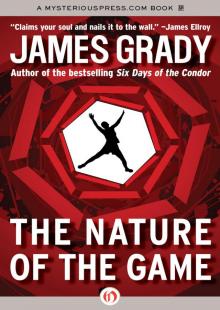 Nature of the Game
Nature of the Game Condor in the Stacks
Condor in the Stacks This Given Sky
This Given Sky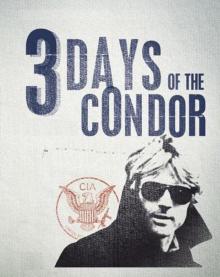 Three Days of the Condor
Three Days of the Condor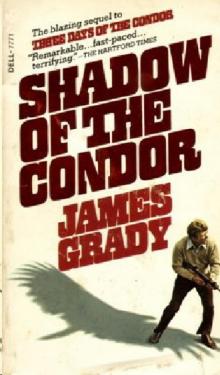 Shadow of the Condor
Shadow of the Condor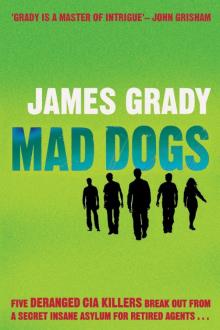 Mad Dogs
Mad Dogs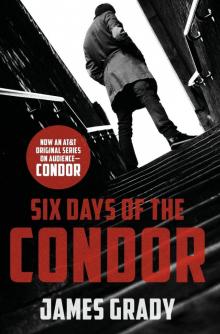 Six Days of the Condor
Six Days of the Condor Next Day of the Condor
Next Day of the Condor